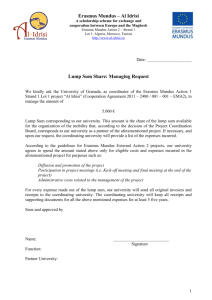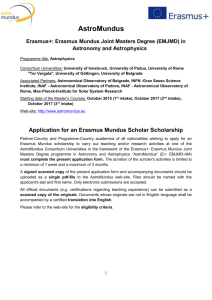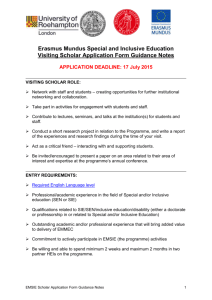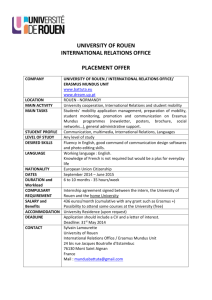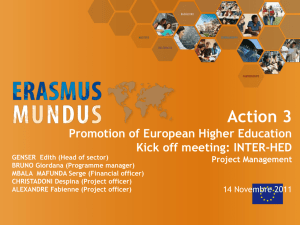SQU Marks Graduation Ceremony
advertisement
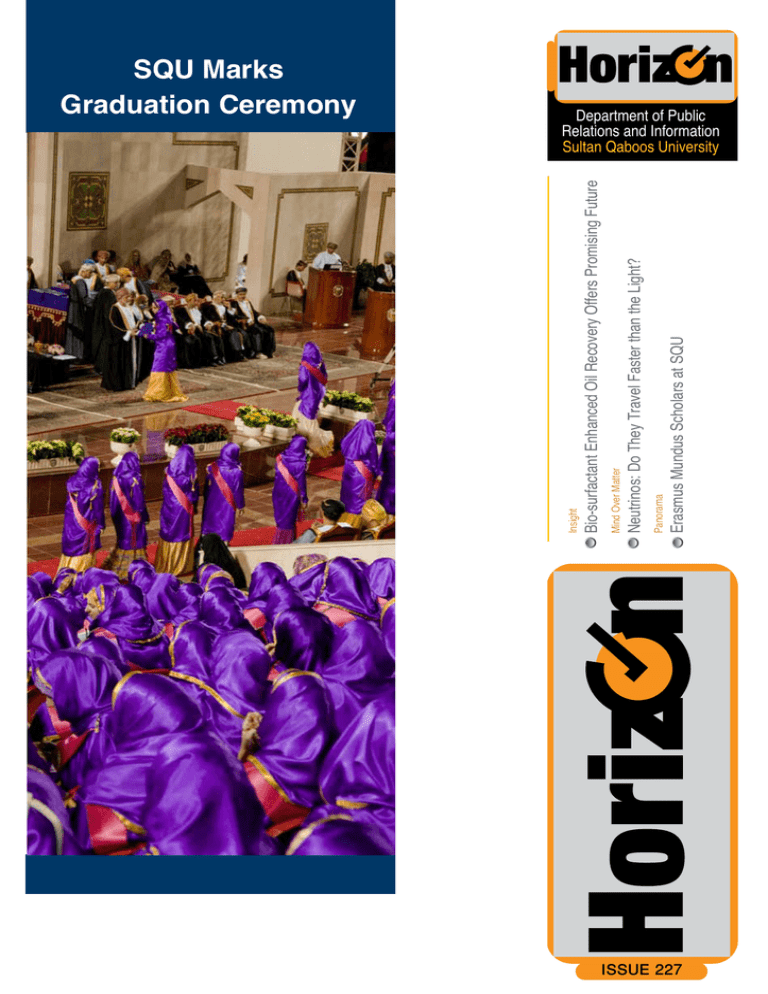
Erasmus Mundus Scholars at SQU Panorama Neutrinos: Do They Travel Faster than the Light? Mind Over Matter Bio-surfactant Enhanced Oil Recovery Offers Promising Future Insight SQU Marks Graduation Ceremony Department of Public Relations and Information Sultan Qaboos University Issue 227 Panorama Erasmus Mundus Scholars at SQU By: Dr. Andy Kwarteng Remote sensing and land degradation studies in Dhofar region: The research project will utilize satellite data, aerial photographs, and field-measured spectral data, for vegetation change detection study in Dhofar region with a unique monsoon climate in the summer. By using times series of remote sensing data collected just before and after the khareef season, it should be possible to investigate if there are any changes in the vegetation cover between years. Any such changes could then be related to changes in the climate or to land degradation from agriculture, e.g. animal farming and overgrazing. The studies will not only include geographical but also biological and social aspects. Therefore it will also include the collection of both quantitative and qualitative field data where the qualitative data may consist of interviews with experts and farmers in the Dhofar region. Conclusions based on quantitative data will then be corroborated by qualitative data and vice versa in order to generate reliable research results. From left to right—Dr. Babu Madhavan, Roger Groth, Dr. Andy Kwarteng and Dr. Per Schubert. The Remote Sensing and GIS Center at SQU recently hosted two Erasmus Mundus scholars from Lund University, Sweden. Dr. Per Schubert (Remote Sensing Specialist) and Roger Groth (Programmer and Database Expert) were attached to the RSGIS Center from October 23 to November 15, 2011. Erasmus Mundus Partnership brings higher education institutes from the European Union to participants from a particular region. SQU recently became a member of the Erasmus Mundus Mobility Program which is funded by the European Union and exchanges staff and postgraduate students between Arab universities and a consortia of higher education institutes from the European Union. The partners in Europe consist of Lund University, Sweden; University of Deutso, Spain; University of Dublin, Ireland; and University of Twenty, Holland. The program at SQU is administered by the Office of External Cooperation. SQU has sent some staff, master’s and doctoral students to some of the participating universities in Europe and have also hosted scholars from Europe. Per and Roger gained new and interesting knowledge about different research projects, courses, and teaching at the Remote Sensing and GIS Center. They, in turn briefed RSGIS staff about research and teaching at Lund University, e.g. the Lund University Master’s Program in Geographical Information Systems (LUMA-GIS) given by the GIS Center at the Department of Earth and Ecosystem Sciences. They enjoyed their short stay in Oman and sharing their experiences with some staff and students at SQU about the differences between the two universities and environments. The intervening Eid holidays gave Per and Roger the opportunity to better understand and enjoy the culture and people of Oman when they visited Nizwa, Salalah and Sur. RSGIS Center and the Erasmus Mundus scholars identified two potential research topics for further collaboration. Distance learning and new teaching methods: RSGIS Center and Lund University will investigate the possibility of creating distance courses in remote sensing and GIS. Lund University has used distance courses for more than 7 years. About Erasmus Mundus Erasmus Mundus is a cooperation and mobility programme in the field of higher education that aims to enhance the quality of European higher education and to promote dialogue and understanding between people and cultures through cooperation with Third-Countries. In addition, it contributes to the development of human resources and the international cooperation capacity of Higher education institutions in Third Countries by increasing mobility between the European Union and these countries. The Erasmus Mundus programme provides support to: higher education institutions that wish to implement joint programmes at postgraduate level or to set-up inter-institutional cooperation partnerships between universities from Europe and targeted Third-Countries; individual students, researchers and university staff who wish to spend a study /research/ teaching period in the context of one of the above mentioned joint programmes or cooperation partnerships; any organization active in the field of higher education that wishes to develop projects aimed at enhancing the attractiveness, profile, visibility and image of European higher education worldwide. Erasmus Mundus is a cooperation and mobility programme in the field of higher education for: the enhancement of quality in European higher education; the promotion of the European Union as a centre of excellence in learning around the world; the promotion of intercultural understanding through cooperation with the Third Countries as well as for the development of Third World Countries in the field of higher education. The European Commission is responsible for the running of the Erasmus Mundus Programme 2009-2013. It manages the budget and sets priorities, targets and criteria for the Programme. The Education, Audiovisual and Culture Executive Agency (EACEA) is responsible for the implementation of the Erasmus Mundus Programme. 10 December 2011 P7
